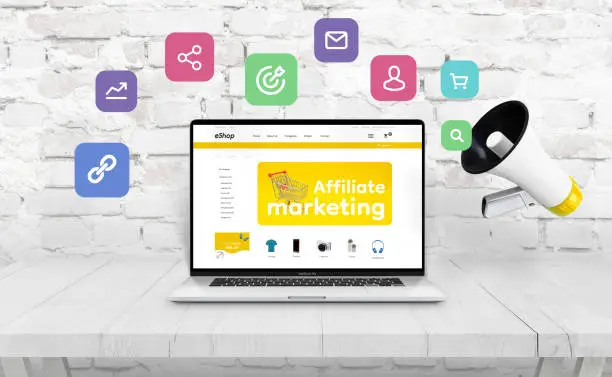Are you looking for a way to make money online with little to no upfront investment? Affiliate marketing might be the perfect solution. It’s one of the most beginner-friendly business models and a great way to start earning passive income online.
This comprehensive guide will explain affiliate marketing in a simple way you can understand, help you get started from scratch, and recommend the best programs you can join today. Whether you’re a student, stay-at-home parent, or aspiring entrepreneur, this is your step-by-step blueprint.
What is Affiliate Marketing?
Affiliate marketing is a type of performance-based marketing where you earn a commission by promoting other people’s or companies’ products. You don’t need to own any product, handle shipping, or manage customer service.
You simply refer potential customers to a product or service using a unique affiliate link. When someone makes a purchase through your link, you earn a percentage of the sale.
You Can Also Read: 10 Essential Skills Every Digital Marketer Needs in 2025
How Does Affiliate Marketing Work?
Here’s a simplified breakdown:
-
Join an affiliate program – You sign up with a company or network.
-
Get your affiliate link – A special URL tracks your referrals.
-
Promote the product/service – Use blogs, social media, YouTube, etc.
-
Earn commission – When someone clicks your link and makes a purchase, you get paid.
It’s as easy as that. No inventory, no customer complaints, just results-based earning.
Why Affiliate Marketing is Great for Beginners
-
Low startup costs – You can start with a blog or social media.
-
No product creation needed – Promote existing products.
-
Scalable income – Earn while you sleep.
-
Flexible schedule – Work from anywhere, anytime.
Many people use affiliate marketing as a side hustle, while others turn it into a full-time business.
Key Terms You Should Know
-
Affiliate – You (the promoter).
-
Merchant – The company selling the product.
-
Affiliate Link – Unique link that tracks referrals.
-
Commission – Your earnings per sale or lead.
-
Cookies – Track how long your referral link is active (usually 30-90 days).
Top Paying Niches in Affiliate Marketing
If you want to earn more per click or conversion, choose high CPC niches. These are topics advertisers are willing to pay top dollar for:
-
Finance & Credit Cards – Credit card referrals, loans, and investing platforms.
-
Health & Wellness – Supplements, diet plans, fitness equipment.
-
Software & SaaS – Online tools, email marketing platforms, CRMs.
-
Web Hosting & Domains – Bluehost, HostGator, Namecheap, etc.
-
Online Education & Courses – Platforms like Coursera, Udemy, Teachable.
These niches tend to offer commissions ranging from $50 to $500+ per sale.
Best Affiliate Programs for Beginners
Here are some trustworthy and beginner-friendly programs:
1. Amazon Associates
-
Easy to get accepted.
-
Thousands of products.
-
Ideal for content creators.
2. ClickBank
-
High commissions (up to 75%).
-
Digital products across many niches.
-
Great for health and info products.
3. CJ Affiliate (Commission Junction)
-
Reputable brands.
-
Easy to track and manage links.
-
Finance, retail, and tech niches.
4. ShareASale
-
User-friendly dashboard.
-
Ideal for bloggers and influencers.
-
Offers both physical and digital products.
5. Impact
-
Big brands like Walmart, Adidas, and Canva.
-
Performance-based structure.
-
Great for software and B2B referrals.
6. Bluehost Affiliate Program
-
$65+ per sale.
-
Recurring income opportunities.
-
Popular among bloggers and YouTubers.
Step-by-Step Guide to Getting Started
Step 1: Choose Your Niche
Pick a topic you enjoy and that has commercial potential. Use tools like Google Trends or Ubersuggest to check interest and CPC.
Step 2: Sign Up for Affiliate Programs
Join the platforms listed above and get your custom affiliate links.
Step 3: Create a Platform
You need a place to promote your links:
-
Blog – Use WordPress, Medium, or Blogger.
-
YouTube – Create videos with product reviews.
-
Social Media – Instagram, TikTok, Pinterest.
-
Email Marketing – Build a mailing list and promote products directly.
Step 4: Start Creating Content
Focus on helpful, honest content:
-
Product reviews
-
How-to guides
-
Comparison posts
-
Case studies
Step 5: Drive Traffic
Use SEO (Search Engine Optimization), social media marketing, and even paid ads if you want to scale.
Step 6: Optimize and Scale
Track which links perform best. Use tools like Google Analytics and Pretty Links to optimize performance.
Tips for Success in Affiliate Marketing
-
Be honest and transparent – Only promote products you trust.
-
Learn basic SEO – Helps your content rank on Google.
-
Choose recurring commission products – SaaS platforms often pay monthly.
-
Build trust with your audience – People buy from those they trust.
-
Use the right tools – Grammarly for writing, Canva for visuals, WordPress for websites.
Common Mistakes to Avoid
-
Promoting too many unrelated products.
-
Ignoring SEO and relying only on social media.
-
Not disclosing affiliate relationships (FTC requires this).
-
Choosing low-paying or scammy programs.
-
Giving up too soon – It takes time to see results.
Frequently Asked Questions
1. Is affiliate marketing really profitable for beginners?
Yes, affiliate marketing can be very profitable, even for beginners. While it takes time and effort to build traffic and trust, many affiliates earn hundreds to thousands of dollars per month after just a few months of consistent work.
2. How much money can I make with affiliate marketing?
Your earnings depend on your niche, traffic, and the products you promote. Beginners might earn $50–$500/month initially, while more experienced affiliates can earn $1,000–$10,000+ per month or more with the right strategy.
3. Do I need a website to start affiliate marketing?
No, you can start without a website by using platforms like YouTube, TikTok, Instagram, or even email marketing. However, having a blog or website can increase credibility and long-term success.
4. How long does it take to see results from affiliate marketing?
Most beginners see their first commissions within 1–3 months if they consistently create quality content. Significant income may take 6–12 months, depending on your niche and marketing efforts.
5. Is affiliate marketing legal and safe?
Yes, affiliate marketing is 100% legal and safe as long as you disclose your affiliate relationships (as required by the FTC) and avoid promoting unethical or scammy products.
6. What are the best platforms to promote affiliate products?
Top platforms include:
-
Your own blog or website
-
YouTube
-
TikTok
-
Pinterest
-
Instagram
-
Email newsletters
-
Facebook groups or pages
7. Do I need to buy the product to promote it?
No, but it’s always better if you have used the product or researched it thoroughly. Authentic recommendations convert better and build trust with your audience.
Conclusion
Affiliate marketing is one of the most accessible and rewarding online business models available today. With little to no investment, anyone can start earning a side or full-time income by recommending products they genuinely like.
Whether you’re promoting software, fitness programs, or digital courses, your success lies in creating helpful, honest content and staying consistent.
Start small, learn along the way, and grow steadily. With time, affiliate marketing can open doors to financial freedom and location independence.
References
ClickBank Affiliate Marketplace
You Can Also Read
10 Essential Skills Every Digital Marketer Needs in 2025
The Difference Between Social Media Management and Community Management
The Difference Between Social Media Marketing & Social Media Management



